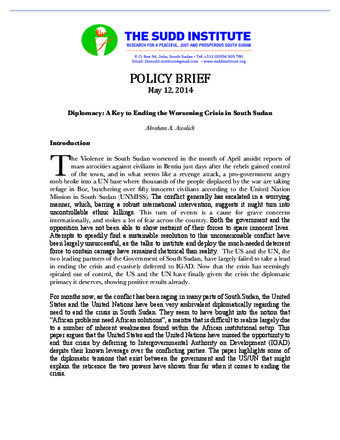Diplomacy: A Key to Ending the Worsening Crisis in South Sudan
Publication Summary
The Violence in South Sudan worsened in the month of April amidst reports of mass atrocities against civilians in Bentiu just days after the rebels gained control of the town, and in what seems like a revenge attack, a pro-government angry mob broke into a UN base where thousands of the people displaced by the war are taking refuge in Bor, butchering over fifty innocent civilians according to the United Nations Mission in South Sudan (UNMISS). The conflict generally has escalated in a worrying manner, which, barring a robust international intervention, suggests it might turn into uncontrollable ethnic killings. This turn of events is a cause for grave concerns internationally, and stokes a lot of fear across the country. Both the government and the opposition have not been able to show restraint of their forces to spare innocent lives. Attempts to speedily find a sustainable resolution to this unconscionable conflict have been largely unsuccessful, as the talks to institute and deploy the much-needed deterrent force to contain carnage have remained rhetorical than reality. The US and the UN, the two leading partners of the Government of South Sudan, have largely failed to take a lead in ending the crisis and evasively deferred to IGAD. Now that the crisis has seemingly spiraled out of control, the US and the UN have finally given the crisis the diplomatic primacy it deserves, showing positive results already.
For months now, as the conflict has been raging in many parts of South Sudan, the United States and the United Nations have been very ambivalent diplomatically regarding the need to end the crisis in South Sudan. They seem to have bought into the notion that “African problems need African solutions”, a mantra that is difficult to realize largely due to a number of inherent weaknesses found within the African institutional setup. This paper argues that the United States and the United Nations have missed the opportunity to end this crisis by deferring to Intergovernmental Authority on Development (IGAD) despite their known leverage over the conflicting parties. The paper highlights some of the diplomatic tensions that exist between the government and the US/UN that might explain the reticence the two powers have shown thus far when it comes to ending the crisis.
Further, the reprehensible state of diplomacy in South Sudan and the diplomatic ambivalence of the US and the UN towards South Sudan allowed this crisis to reach this stage. The latest United States and UN diplomatic surge, including recent high-level diplomatic visits from the UN and the US to South Sudan, have positively influenced the parties and brought them close to resolving this crisis. These high-level engagements from the US and the UN must be sustained even after any agreement. Similarly, a mere threat of sanctions that is divorced from a robust diplomatic engagement might be unhelpful as such threats stand to either force the parties to reach an agreement haphazardly or elongate the conflict, especially if the affected parties read them variably.
Abraham Awolich is the former Managing Director of the Sudd Institute. Awolich’s research has focused on management of development organizations working in conflict mitigation, governance and business management. Awolich is the co-founder of the Sudan Development Foundation and the former Executive Director of New Sudan Education Initiative (NESEI). Previous to joining the Sudd Institute, Awolich helped establish a secondary school in Yei and a medical clinic in Kalthok, Awerial County. Awolich has a Master’s Degree in Pubic Administration from the Maxwell School of Citizenship and Public Affairs at Syracuse University and Bachelor’s Degree from the University of Vermont in Anthropology and Business Administration. Awolich is a McNair Scholar and winner of the prestigious Samuel Huntington Public Service Award in 2006.

